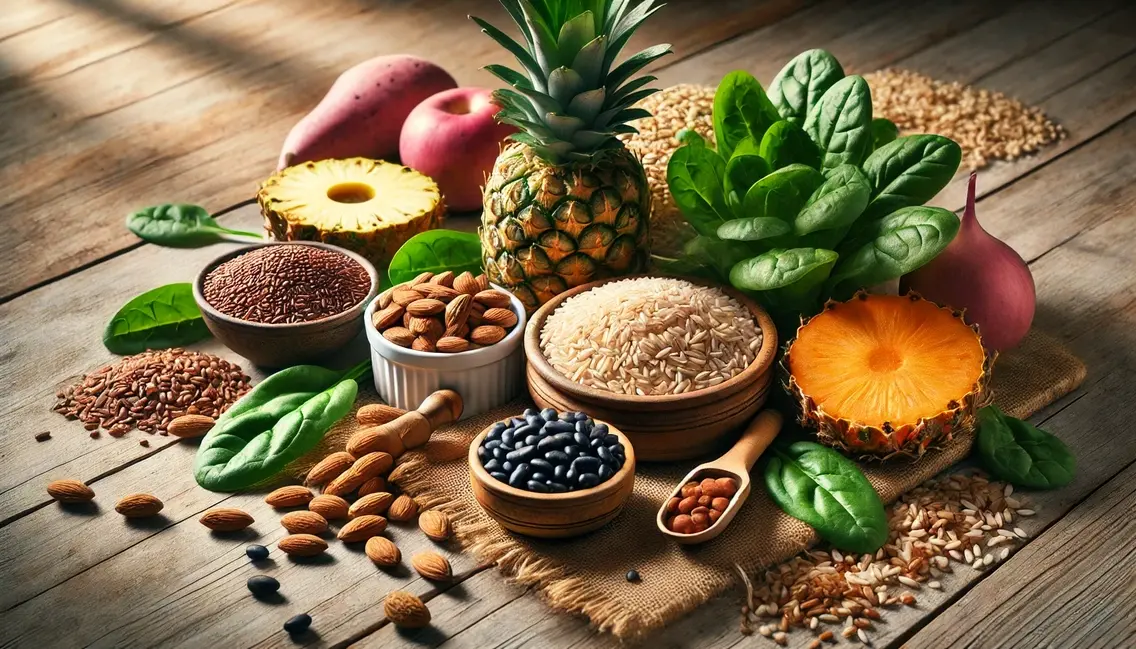Unveiling Manganese: The Secret Mineral Your Body Craves
Have you ever wondered about the hidden heroes working tirelessly within your body? Meet manganese—a mineral often overshadowed by its more famous counterparts, yet it holds the keys to robust bones, a vigorous immune system, and a remarkable metabolism. But here's the shocking part: despite its critical roles, this unsung nutrient rarely receives the recognition it deserves. So, what makes manganese a game-changer for your health?
Did you know that manganese is pivotal for better bone health and wound healing? Or that it plays a crucial part in protecting your cells from harmful oxidative stress through its role in forming superoxide dismutase? But beware, a deficiency, although rare, can lead to weak bones and impaired glucose tolerance, all affecting your vitality.
Separating myths from reality, many mistake manganese for magnesium, but don't be fooled—these minerals serve distinct roles in your body’s orchestra of functions. While magnesium might assist muscle function and energy production, manganese is indispensable for crafting that foundation of wellness.
For those with liver concerns or certain health conditions, caution is advised since manganese accumulation can pose risks. Before diving into any new supplement regimen, consulting an expert is wise to personalize your approach.
Ready to explore the profound impact manganese can have on your well-being? Let’s delve deeper into this essential mineral and reveal how it can transform your health landscape.
Health Benefits of Manganese
Manganese is an indispensable trace mineral that plays a key role in vital biological processes within our bodies. From bolstering bone health to aiding metabolism and offering antioxidant protection, manganese contributes immensely to our overall well-being.
Key Health Benefits
- Supports Bone Health
Manganese is fundamental for the formation and upkeep of bones. It assists in synthesizing connective tissue and enhances bone mineral density, making it crucial for preventing bone disorders and maintaining skeletal health.
- Facilitates Metabolism
Acting as a cofactor for multiple enzymes, manganese helps in the metabolism of carbohydrates, amino acids, and cholesterol. These processes are essential for generating energy and optimizing the use of nutrients, directly impacting your vitality.
- Enhances Antioxidant Defenses
As a component of the antioxidant enzyme superoxide dismutase (SOD), manganese plays a critical role in protecting cells from oxidative damage by neutralizing harmful superoxide radicals. This protective action helps lower the risk of chronic diseases linked to oxidative stress.
- Supports Wound Healing
Manganese is involved in the synthesis of proline, an amino acid vital for producing collagen. This is crucial for tissue repair and regeneration, enhancing the body's ability to heal wounds effectively.
Optimizing Health with Manganese
Fully understanding the importance of manganese underlines its significant contributions to bone health and antioxidant protection. To ensure your daily manganese requirements are met, it’s essential to explore dietary sources and consider how your nutrition can be optimized for long-term health benefits.
Dietary Sources of Manganese
Discover the range of natural foods abundant in manganese, an essential mineral contributing to bone health, metabolism, and antioxidant defenses. While these foods are beneficial, many individuals find it challenging to consistently meet their daily manganese requirements through diet alone.
Natural Sources of Manganese
- Whole Grains
Whole grains like brown rice, oats, and quinoa are notable for their manganese content. They also provide dietary fiber, which is instrumental for digestive health. However, obtaining sufficient manganese solely from whole grains may require consuming larger portions regularly, which can be impractical for some.
- Nuts and Seeds
Nutrient-rich nuts such as almonds and seeds like pumpkin seeds are excellent sources of manganese. Additionally, they provide healthy fats and proteins. While they're a convenient snack, relying purely on nuts and seeds can make achieving your manganese intake difficult, especially with their higher calorie content.
- Leafy Green Vegetables
Spinach and kale are leafy greens that offer a good manganese supply alongside other essential nutrients. Incorporating enough of these greens consistently can require creative meal planning, as their manganese content alone might not meet daily needs.
- Legumes
Foods like beans, lentils, and chickpeas are rich in manganese and provide plant-based protein and fiber. Though beneficial, integrating enough of these legumes to fulfill the daily manganese requirement can be a dietary hurdle if not regularly included in varied dishes.
- Seafood
Varieties of seafood, including mussels and clams, contain manganese along with omega-3 fatty acids that support cardiovascular health. While they enrich your diet, accessible and frequent consumption to meet daily manganese might be challenging due to dietary preferences or availability.
Incorporating Manganese-Rich Foods
To achieve the recommended daily manganese intake, considering these diverse food sources is wise. Integrating nuts and seeds into your breakfast or legumes into your meals offers multiple options for enhancing your manganese levels. However, given the dietary limitations and practical challenges of purely natural sources, exploring alternative support, such as supplementation, might be necessary to help you consistently meet your nutritional goals.
Daily Intake for Manganese
Manganese is essential for bone development, immune system support, and metabolic processes. This important trace mineral is integral to the body's antioxidant defenses, notably by forming superoxide dismutase, an enzyme that protects cells from oxidative stress. While manganese deficiency is uncommon, maintaining adequate levels is vital for overall health and proper developmental functions.
Recommended Daily Intake
Understanding and adhering to the recommended daily intake of manganese helps ensure your body functions optimally:
- 1-3 years: 1.2 mg per day
- 4-8 years: 1.5 mg per day
- 9-13 years: 1.9 mg per day
- 14-18 years (male): 2.2 mg per day
- 14-18 years (female): 1.6 mg per day
- Adults (male): 2.3 mg per day
- Adults (female): 1.8 mg per day
- Pregnant women: 2.0 mg per day
- Breastfeeding women: 2.6 mg per day
Meeting Your Daily Manganese Needs
Ensuring you meet your daily manganese intake is straightforward with a balanced diet that includes nuts, whole grains, legumes, and leafy green vegetables. It's crucial to avoid overconsumption of manganese supplements unless recommended by a healthcare professional, as excessive intake can lead to complications. Remaining consistent in your dietary habits will fortify your manganese levels and support your body's nutritional health. Next, we'll delve into recognizing the symptoms of a manganese deficiency and how to counteract them effectively.
Deficiency of Manganese
Manganese is a trace mineral indispensable for numerous physiological operations, including bone health, antioxidant defense, and metabolic processes. While manganese deficiency is uncommon, the potential health risks are too significant to overlook. Without sufficient manganese, you risk undermining your body's ability to build strong bones and maintain a healthy metabolism.
Deficiency Symptoms and Consequences
- Skeletal Abnormalities
Vital to bone formation and maintenance, manganese deficiency can lead to weakened bones and skeletal deformities, stemming from impaired bone development and mineralization.
- Impaired Glucose Tolerance
Manganese plays a critical role in carbohydrate metabolism and insulin signaling. A deficiency can lead to impaired glucose tolerance, increasing the risk of metabolic disorders such as type 2 diabetes.
- Metabolic Dysfunction
As a necessary cofactor for multiple enzymes involved in metabolism, insufficient manganese disrupts normal metabolic functions, impairing energy production and storage.
Preventing Manganese Deficiency
Even though manganese deficiency is rare, ensuring you receive enough is essential for maintaining optimal bone health and metabolic balance. Incorporate manganese-rich foods like nuts, seeds, whole grains, and leafy green vegetables into your diet to preserve your manganese levels.
Want to explore more about manganese, its myths and facts, and how it affects your overall well-being? Dive into our FAQs section to satiate your curiosity and separate fact from common misconceptions about this crucial nutrient.
Conclusion
As we unveil the hidden powerhouse that is manganese, the question beckons: how well are you fortifying your own health landscape with this essential nutrient? While it may not shine in the spotlight like other minerals, manganese is the quiet champion of robust bones, efficient metabolism, and vigorous immune defense. The knowledge you gain about manganese is more than just an addition to your wellness repertoire—it's an invitation to recalibrate and optimize your health journey.
So, now that we've delved into the critical roles and sources of manganese, consider this your starting point. How might you reimagine your dietary habits to naturally incorporate more of this incredible mineral? Is it time to rekindle an old affinity for leafy greens or introduce new vibrant meals featuring seafood and legumes?
We encourage you to explore, discuss, and share these insights. Whether it's a casual chat with your gym buddy or a thoughtful reflection with your family at the dinner table, your newfound knowledge of manganese can spark meaningful conversations. Share this article with those aiming to cultivate a more holistic approach to their health—because understanding and tackling the nuances of nutrition is a task best undertaken together.
Remember, significant health transformations come through informed choices and consistent actions. Dive into your options with a curious mind and a commitment to sustaining the vibrant life you envision. Fuel your wellness journey wisely, starting with the overlooked yet mighty manganese. The time for change is now—how will you leave your mark?

